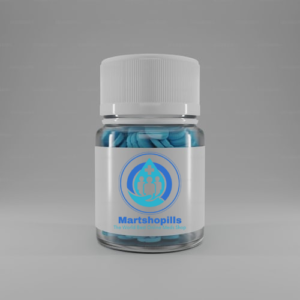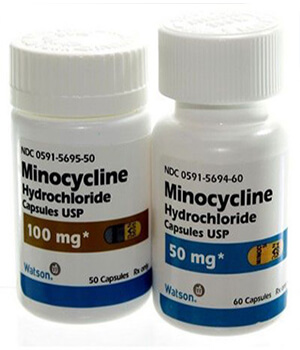Description
Minocin (Minocycline) 100mg Tablets
Minocin (Minocycline) is a broad-spectrum tetracycline antibiotic used to treat bacterial infections. It is commonly prescribes to treat acne vulgaris and prevent the occurrence of acne flare-ups. Minocin 100mg Tablets are a potent formulation that provides a higher concentration of minocycline compared to lower doses.
Indications
Minocin 100mg Tablets are prescribes for the treatment of the following bacterial infections:
1. Acne vulgaris: Minocin is primarily used to treat moderate to severe acne. It helps in reducing inflammation, redness, and swelling associated with acne breakouts.
2. Respiratory infections: Minocycline can be prescribed to treat bacterial infections of the upper respiratory tract, including bronchitis, pneumonia, and sinusitis.
3. Skin infections: Minocycline is effective against skin infections caused by bacteria, such as folliculitis, impetigo, and syphillis.
4. Lyme disease: Minocycline is used in combination with doxycycline to treat Lyme disease, a tick-borne infection that can cause inflammation, joint pain, and neurological problems.
Dosage and Administration
Minocin 100mg Tablets should be takes orally as directed by a healthcare professional. The usual dosage for acne treatment is as follows:
– Adults: 100mg twice daily or 50mg twice daily, taken with food.
– Children: The dosage may vary depending on the child’s age and weight. Consult with a healthcare professional to determine the appropriate dosage.
It is important to follow the doctor’s instructions regarding the proper dosage and duration of treatment. Minocycline should be takes at regular intervals to ensure optimal effectiveness.
Side Effects
Minocin may cause side effects in some patients. Common side effects may include:
– Nausea and vomiting
– Diarrhea
– Abdominal pain
– Headache
– Dizziness
– Skin rash
– Itching
If these side effects persist or become bothersome, it is recommend to consult with a healthcare professional.
Precautions
Before taking Minocin 100mg Tablets, patients should be aware of the following precautions:
– Allergic Reactions: Minocycline can cause allergic reactions in some individuals. If you have a known allergy to tetracycline antibiotics or any other ingredients in the formulation, do not take Minocin.
– Gastrointestinal Disorders: Minocycline should be use with caution in patients with gastrointestinal disorders, as it may cause diarrhea or worsen existing conditions.
– Porphyria: Minocycline should not be use in patients with porphyria, a genetic disorder that causes abnormalities in heme metabolism.
– Kidney Function: Minocycline may cause kidney damage in individuals with impaired kidney function. It is recommend to monitor kidney function while taking this medication.
– Pregnancy and Breastfeeding: Minocycline should only be use during pregnancy or breastfeeding when recommended by the healthcare professional.
Storage
Minocin 100mg Tablets should be stores at room temperature away from moisture and heat. Keep them out of reach of children. Dispose of any unused or expired tablets according to the instructions provided by your healthcare provider.
Conclusion
Minocin (Minocycline) 100mg Tablets are a potent formulation use to treat bacterial infections, including acne vulgaris, respiratory infections, skin infections, and Lyme disease. It is important to follow the doctor’s instructions regarding the dosage and administration of Minocin to minimize the risk of side effects and ensure effective treatment.




Lilian (verified owner) –
The item and the design are very cool. Also the support is amazing, they always help you with any detail that you have.
Emmalee (verified owner) –
Think everyone should know about this, it’s just beyond my expectations
Minnie (verified owner) –
Been using a lot of items, this one is obviously the best
Emilie (verified owner) –
I rarely leave a comment, but this item is beyond worth it! Gotta let you guys know!
Destini (verified owner) –
Thank you for delivering my order. I will be in touch with you again in the future.
Osvaldo (verified owner) –
I was very disappointed before, but when I came to your website, I found more hope and comfort in you.
Sabrina (verified owner) –
I will also tell my friends to refer you.
Jaida (verified owner) –
Good response from the support.
Torrey (verified owner) –
Great item! It provides too many things compared to its price charged.
Sandy (verified owner) –
Been using a lot of items, this one is obviously the best
Luciano (verified owner) –
I got excellent support for this item. They were patient with me, and helped me solve my issue. I recommend this company 100%
Norval (verified owner) –
Think everyone should know about this, it’s just beyond my expectations
Myrtle (verified owner) –
This is the coolest thing I’ve found on here! Will keep using your products in the future!
Bernadette (verified owner) –
An awesome product with great flexibility. The customer support is superb. I recommend this without any doubt.
Raquel (verified owner) –
I will also tell my friends to refer you.
Rene (verified owner) –
Been using a lot of items, this one is obviously the best
Abe (verified owner) –
Wished I had found this sooner, it took me a lot of money and time until I found my dream product here!
Janiya (verified owner) –
I want to say thanks to the support team for helping with my continuously silly questions, you’re the best!
Earl (verified owner) –
I am 100% satisfied with your service.
Gina (verified owner) –
Wished I had found this sooner, it took me a lot of money and time until I found my dream product here!
Rosalinda (verified owner) –
I got excellent support for this item. They were patient with me, and helped me solve my issue. I recommend this company 100%
Jordon (verified owner) –
An awesome product with great flexibility. The customer support is superb. I recommend this without any doubt.
Ida (verified owner) –
Wished I had found this sooner, it took me a lot of money and time until I found my dream product here!
Brooke (verified owner) –
It’s far better than those similar products, while the price is still acceptable.
Xavier (verified owner) –
This is the coolest thing I’ve found on here! Will keep using your products in the future!
Aric (verified owner) –
Great item! It provides too many things compared to its price charged.
Alva (verified owner) –
The first time I got the urges to leave a comment, but this is simply a top-notch thing you can find.
Novella (verified owner) –
An awesome product with great flexibility. The customer support is superb. I recommend this without any doubt.
Roy (verified owner) –
The first time I got the urges to leave a comment, but this is simply a top-notch thing you can find.
Lynn (verified owner) –
Good response from the support.